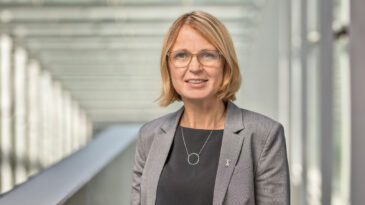Closed doors damage trust
28 nov 2022 • 5 min
SURVEY Limited transparency and poor communication. Biblioteksbladet’s survey shows that the turbulence is raising questions among IFLA members in Sweden.

The questions
1) Is IFLA a transparent organisation?
2) Do you have a good understanding of the cooperation between IFLA and the SIGL Foundation?
3) Do you have confidence in how IFLA is led?

Karin Grönvall
Head of the National Library of Sweden.
1) Due to its size and scope, we have to take into account that there are several levels and structures. I feel that the work on committees, and cooperation between the committees, is transparent. On the other hand, the Board has not been able to convey the sense of security, determination and transparency that the organisation’s members have needed and should have received during a turbulent time.
2) What has been clear is that the Chair stated publicly that SIGL was created in order to minimise the taxes paid on the funds that the Bill and Melinda Gates Foundation contributed. The connection to IFLA, the management etc., is not clear.
3) KB (the National Library of Sweden) remains an institutional member and believes in IFLA as an organisation. We believe that confidence in the organisation will recover with the help of members who believe that IFLA and the sector can organise themselves in a democratic and transparent way, and make demands on the management. For continued trust, management must be open to addressing any situations that arise and communicate openly with members.

Morgan Palmqvist
Senior Librarian, Gothenburg University Library.
1) The problems and discussions of the past year have shown that IFLA is not as transparent as expected. It is a member-driven organisation and must look after the best interests of its members, be transparent and inclusive. And, last but not least, it ought to create trust in the Board, which is elected by the members.
2) Very little transparency.
3) Well, there is a belief that the current Board wants to be more transparent and reliable, but they still have far to go.

Daniel Forsman
City Librarian, Stockholm.
1) It can be difficult to understand how IFLA works. Those who have been involved for a long time work in established structures where short cuts, roles and the ways of doing things have become the natural way of doing things. As with any organisation, it is difficult to free yourself from your own structure as needs evolve and the world around you evolves. In an international context, it is no wonder that there are differences of opinion about strategic or operational issues. Embracing these and finding structures to work with them is one of IFLA’s major challenges, and today
I feel that the organisation prioritises the appearance of unity, and thus transparency suffers.
2) IFLA’s current operations are financially dependent on SIGL. Because an independent foundation is financing activities carried out in an association, it is of course interesting for members to understand how the two are connected and how the strategic agenda has been set. Here, in my opinion, the organisations have not been transparent enough. This affects confidence and opens up unnecessary speculation.
3) It has been a stormy time for IFLA. I think that the Swedish Library Association has acted constructively, and set a good example, by motioning that IFLA needs to improve its communication in order to become more transparent. This motion was passed by a large majority and I now expect greater clarity on how IFLA should act in the future. Confidence in the management of IFLA has been affected and Stockholm Public Library is considering not renewing its membership. However, not having our own membership does not prevent us from being active within IFLA, as institutional members of the Swedish Library Association can work within IFLA.

Anna Troberg
Chair, DIK (trade union).
1) No, unfortunately not. The recent internal conflicts and their management have created an image of IFLA as a fairly closed and top-down organisation. It is important that as an organisation we put an end to this once and for all and are much more transparent, going forward.
2) The cooperation between IFLA and SIGL is an area that would benefit from much greater transparency. There is a lot that is unclear at the moment and of course this creates uncertainty among the member organisations, which damages trust in both IFLA and SIGL
3) ) It is clear that confidence in IFLA has been damaged by all the turbulence that has occurred. I hope the criticism is taken seriously and in the future they will actively work transparently to restore the trust they have lost. IFLA’s strength is entirely dependent on a strong member commitment. We cannot afford to lose the confidence of our members.

Karin Linder
Secretary General, Swedish Library Association.
1) Definitely not, it’s very difficult to understand IFLA’s finances, the relationship between the different levels of the organisation. Election to the Board takes place among groups of friends, cliches and non-transparency.
2) Zero transparency. It’s really bad that there is no insight into the relationship between the two associations.
3) I’ve always wondered about the management, especially due to all the empty words. We are IFLA — what is that?

Lars Burman
Senior Librarian, Uppsala University Library
1) Unfortunately, large organisations with complex structures often lack transparency. IFLA could do more to be perceived as transparent. Trust needs to be restored, especially after a large crisis, and this is best done through reforms and open communication.
2) I have not had reason to delve into the matter, but I know the construction. I cannot say that I feel there is transparency, but I have not tried to look closely either.
3) IFLA has a crisis behind it. If activities and management work develop as promised, much of the trust can be regained.

Torbjörn Nilsson
City Librarian, Malmö.
1) No, not at the moment, not even for its members. The Chair/Governing Board determines the degree of transparency.
2) I have not. It is a financial construction that benefits IFLA.
3) More transparency is needed to be able to answer that question. That’s why it’s a ’no’.

Maria Haglund
Chief Librarian, Royal Institute of Technology Library.
1) IFLA in general is perceived by many as administratively heavy and quite difficult to navigate.
2) Have not looked into the collaboration.
3) The new management has an important mission in creating trust in the organisation, and showing how they want to work with development through transparent leadership. The seminar at the IFLA conference in Dublin this summer, Out in the Open: Recent Governance Developments at IFLA, was a good first step, but more action will be needed.
Senaste nytt

Drygt två veckor med Trump och kulturkriget trappas upp
Med Trump som president ökar pressen mot USA:s bibliotek och deras personal. I Texas ligger flera lagförslag som kan kriminalisera bibliotekariers arbete. Hittills har de amerikanska kulturkrigen även nått oss, så frågan är när Sverige också drabbas av en upptrappning?
4 feb 2025 • 4 min

Replik: Vi måste börja med det mest akuta
Per Kornhall gläds åt att kurslitteraturens kris har nått debattsidorna och framhäver återigen de fem förslag som Läromedelsförfattarna har presenterat. ”Om vi vill förbli en stark kunskapsnation måste vi agera – och det nu.”
3 feb 2025 • < 1 min

Svenska Pens nya fokus: bibliotek
Svenska Pen ökar sitt engagemang kring situationen på folk- och skolbiblioteken. Bland annat inrättas en projektledartjänst under våren.
30 jan 2025 • < 1 min

Replik: Förlagen bär ansvaret för kurslitteraturens kollaps
Det är beklagligt att Per Kornhall inte vill ställa förlagen mot väggen, skriver Lars Iselid i en replik i debatten om svensk kurslitteratur. ”E-boksavtalen är grundproblemet.”
30 jan 2025 • 2 min

Begränsat utlån av hbtqi-bok efter klagomål
När en elev lånade hem boken "Gender Queer" från skolbiblioteket blev föräldrarna så upprörda att de kontaktade skolan. Följden blev att boken bara får lånas ut till skolans högstadieelever.
29 jan 2025 • 3 min

Hbtqi i skottlinjen – men färre fall än befarat
Arton händelser har anmälts till brevlådan för påverkansförsök. Färre än befarat, konstaterar Svensk biblioteksförenings generalsekreterare Silvia Ernhagen. Oftast handlar det om regnbågsflaggor och hbtqi-tema, men även anklagelser om häxkonst.
28 jan 2025 • 2 min

Replik: Ansvaret ligger på oss alla
Upphovsrätten och ersättning är förutsättningar för att svensk kurslitteratur ska skrivas. Då är open acess inte en lösning, skriver Per Kornhall, ordförande för Läromedelsförfattarna, i en replik till Lars Iselid.
28 jan 2025 • 2 min

Kränkande material – en fråga för KB:s nya expertråd
Nybildade rådet för nationella minoriteter ska hjälpa KB att lyfta minoriteternas kulturarv. En brännande fråga handlar om hur det kränkande material som har samlats in genom historien och nu finns i samlingarna ska presenteras.
27 jan 2025 • 2 min

Debatt: Läromedelsförfattarnas analys brister
Begagnatmarknaden bär inte skulden för krisen för svensk kurslitteratur. Läromedelsförlagen måste erbjuda en bra betallösning för e-böcker, skriver Lars Iselid, forskningsbibliotekarie, i ett svar på Per Kornhalls förslag som han kallar för konstgjord andning.
24 jan 2025 • 3 min

Bibliotekspersonal filmades – upplevdes som obehagligt
På två bibliotek i Stockholm har personalen blivit filmad av besökare. Båda incidenterna har upplevts som obehagliga av personalen och därför anmälts. ”Vi ser över våra riktlinjer”, säger stadsbibliotekarie Daniel Forsman.
23 jan 2025 • 2 min

Unik studenthistoria digitaliserad
Vilka var 1700-talets studenter på V-Dala nation i Uppsala? Det och andra historiska uppgifter om studenterna på universitetet finns nu att hitta för alla i digitaliserad form. ”Otroligt fascinerande material.”
23 jan 2025 • 3 min

KB:s insamling av medier fortsatt viktig – även under krig
Kungliga biblioteket begärde 46 extra miljoner för att göra nationalbiblioteket redo i fall av krig. Men det blev inga extrapengar från regeringen och KB måste göra omprioriteringar för att göra nödvändiga förberedelser.
22 jan 2025 • < 1 min



0 kommentarer